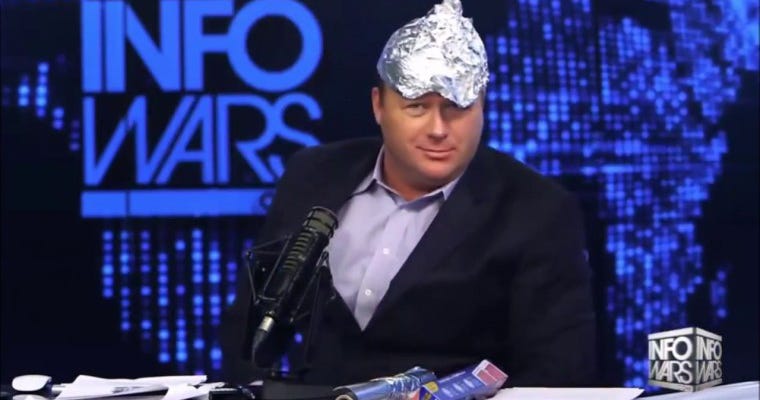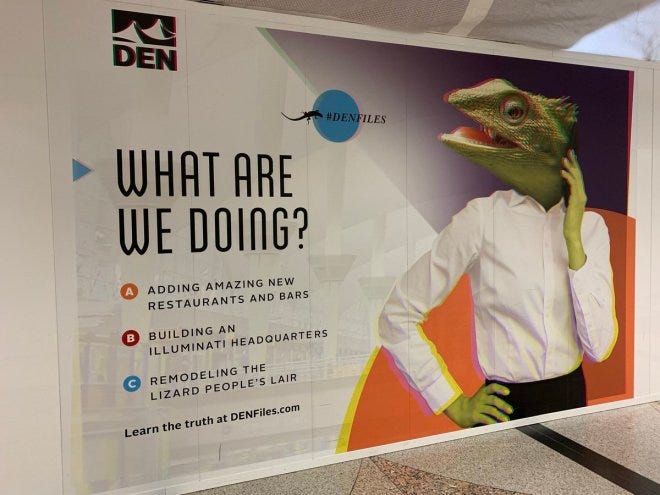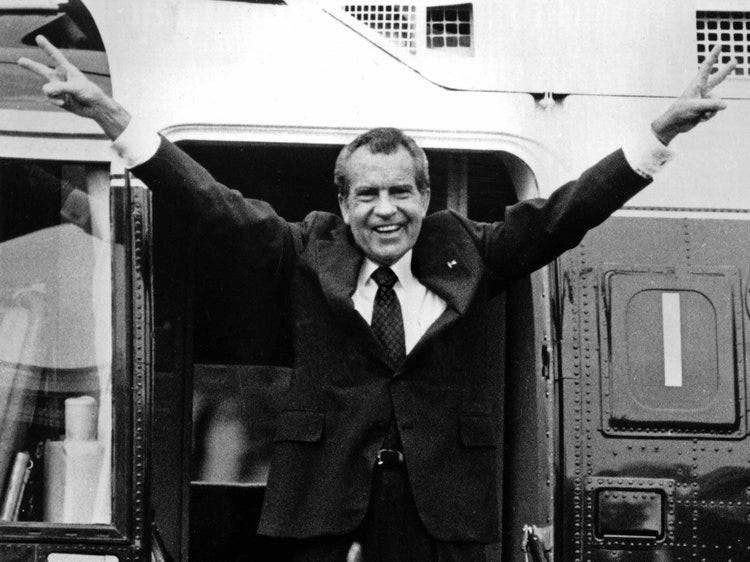A lot of conspiracy theories appear on the internet. Either they’ve become more common in recent years, or I’m just noticing them more. Anyway, I’m going to comment on what these theories are like, and why I tend to find them implausible, and how they differ from real conspiracies.
1. Patterns of Conspiracy Theorizing
Any time there is a big story about something bad that just happened, if there is any way of having a conspiracy theory about it, you can expect to see these theories popping up. A common pattern is the ironic plot twist: the bad thing was planned by the very person or group who is supposed to be protecting us from that thing!
E.g., if another major terrorist attack occurs in the U.S., there will be people saying that it was planned by the President, the CIA, Homeland Security, or something like that. If there is a disease outbreak, some people will say it was planned by the government or by drug companies. The government and big corporations are favorite characters in conspiracy theories, and the favorite motives are to secure money and power. Left-wingers prefer evil corporation stories, while right-wingers prefer evil government stories.
These are also popular themes in Hollywood movies and TV shows, especially the one about evil businessmen who plan a disaster so they can profit off it. That’s because these make good stories. But I think these fictional stories influence people’s perception of how reality works.
The evidence for the theory is usually some alleged anomalies in the details of the event, given the official story. E.g., in the case of the JFK assassination, there was a surprising number of bullet holes, given the number of shots Oswald is supposed to have fired. (See Oliver Stone’s entertaining film, JFK.)
Sometimes, there are theories that are just absurd, with no attempt to cite evidence, like the theory that the Obama administration started child slave labor camps on Mars (https://www.huffpost.com/entry/nasa-child-slave-alex-jones_n_5956c4a7e4b0da2c732394d7).
2. Implausibility of Conspiracy Theories
Human nature
I don’t have statistics on how often people conspire, or how many disasters are caused by conspiracies. But I tend to give conspiracy theories very low prior probabilities. So low that I don’t listen to their “evidence” or try to rebut it; I just ignore them. Most sensible people do the same. Why do we do this? When we hear a conspiracy theory about some event that we have essentially no background knowledge of (like, an event that we only just learned of), how can we just assign an extremely low probability to it off the bat?
I think one factor is that these theories fail to fit with my general sense of what human beings are like. In this life, I’ve met some humans, interacted with some humans over the internet, and read about stuff that has happened to humans in cases where the main facts are not in dispute. Based on all that, I have some vague expectations about how things would go if you tried to carry out a conspiracy of the sort that I read about on the internet.
To bring this out, imagine that you’re the President circa 2001, and an amazing idea has just occurred to you. If there were to be a major terrorist attack on the U.S., killing thousands of people, your approval ratings would go up by a lot. (That’s really true.) Also, you could probably get Congress to authorize more wars. (True.) All it would take would be a little mass murder. You decide to try to bring about such an attack.
<< Aside: this story is already improbable. In my years on this Earth, I do not believe I have ever met a human being who was like the President depicted in the story so far. Granted, there are psychopaths, who would not blink at the prospect of killing thousands to achieve some minor benefit to themselves. And granted, I have not met any U.S. Presidents or other high government officials. So perhaps, in this story, you are a psychopath who has been elected President. Whatever. >>
What’s next? You’re not going to plant the explosives by your own hand. You call up … Who? Your chief of staff? Your CIA director? … to help. You’re going to need some demolitions experts to plant the explosives. That’s probably a multiple-person job. You’re going to have to ensure that no one sees them planting the explosives, or that if someone does, that person won’t call the police, or that if the police are called, they won’t investigate it or tell anyone about it afterwards. So you’re going to need some other people to figure out how to make that happen. Then you’re going to need some Arabs to fly planes into the World Trade Center at the right time. You’re just a politician, so you don’t personally know the people who would do these jobs. You bring in some of your staff members, maybe someone in the military, or the CIA, and tell them … what? That you’re planning on blowing up the World Trade Center and making it look like a terrorist attack, so you can get reelected in 2004?
Then what happens? What would you actually expect to happen to you, if you were to do something like this in reality, not in a Hollywood movie? I don’t know about you, but I would expect to be out of office via the 25th Amendment later that day, locked in a room with guards stationed outside my door to make sure I don’t try to do any other crazy shit.
Oh, but maybe you only talk to your most trusted confidants about this conspiracy. Right. Now think about your most trusted friends and colleagues. In reality, I mean, the actual people whom you have known in your life, not the characters you’ve seen in movies. Approximately how many of them do you figure would go along with you if you told them that you wanted to blow up a building and murder a bunch of people? I don’t know about you, but I don’t think I have ever known one such person. I think every person I’ve ever known would (a) first assume that I was joking, then (b) if I could actually convince them I was serious, would either try to stop me themselves, call the police, or call a psychiatrist.
Why would your cabinet members (or whomever you’re involving) agree to join in mass murder, risking life imprisonment, to help you get reelected? Maybe they are pro-war ideologues? Okay, but what real-world ideology, other than Islamic extremism, would consider something like the 9/11 attack to be good? Do you know any actual conservatives, liberals, or other ideologues who would have condoned the 9/11 attack as a means of bringing about a war, or reelection of their party’s President?
Lots of other people will have to be brought into the plan. They don’t all have to know why they’re doing what they’re doing. But eventually, after you’ve brought down the buildings, you’re going to need to be sure that all those people who worked on your “project” keep their mouths shut. There can’t be one of them who thinks that you’ve done a crazy, horrible thing that has to be reported. Since I don’t know anyone in real life who wouldn’t consider it a crazy, horrible thing, I think your prospects of pulling off the conspiracy would be slim. Furthermore, I think that if you’re the U.S. President, you’re probably savvy enough to know that at the beginning.
Human Immorality
Note that I’m not saying humans are too moral to engage in criminal conspiracies. There are clearly plenty of horrible human beings. Political leaders have done plenty of horrible things. They do not, however, do just any horrible thing; there are patterns to human horribleness.
For instance, ideologues tend to target specific outgroups. If you’re a right-wing ideologue, you might want to do horrible things to foreigners whom you consider a threat to your state. If you’re a religious zealot, you might want to do horrible things to infidels and heretics. But you would generally not want to do horrible things to your ingroup (not even as an excuse for harming the outgroup).
Government officials also sometimes violate the law. But again, not just any law at any time; there are patterns. And blowing up a building full of ordinary Americans in Manhattan just doesn’t fit the pattern of the crimes government officials commit.
Biases
If the existence of a theory is easily explained by common biases, I tend to chalk it up to such bias and not look at it further. Conspiracy theories are so common that it is simplest to suppose that (some) humans have a bias toward conspiracy theories, rather than to suppose that really there are all these initially surprising conspiracies.
The conspiracy theories satisfy our need for drama. They’re interesting, dramatic stories, calculated to arouse outrage. I just don’t think the world behaves like that. The stuff that really happens in the world is usually more boring, with more random noise messing things up. E.g., if a student doesn’t show up to class, it’s more likely that he overslept, or didn’t feel like coming, or got a flat tire on the way, rather than that he is an international spy who was caught in the middle of a high-speed car chase with Interpol at the time he was supposed to come to class.
3. Real Conspiracies
That said, of course there are real conspiracies in the world. Nixon really conspired to undermine the Democrats with the Watergate break-in and other shenanigans. Reagan really conspired to divert money to the Nicaraguan Contras after Congress refused to authorize aid to the Contras.
How do these real conspiracies differ from the (I assume) fictional conspiracies like the 9/11 “inside job”?
One thing I notice is that the real conspiracies are a lot less exciting. Nixon sending a few people to spy on the Democrats to try to collect dirt on them (or whatever he was doing) is nowhere near as exciting as Bush planning to blow up the World Trade Center.
Relatedly, the real conspiracies are things that I simply have a much easier time imagining a normal, non-psychopathic person considering justified. I bet a lot of real Republicans thought Reagan’s illegal Contra support was justified. (Oliver North even became something of a right-wing hero after testifying unapologetically about his role in the conspiracy. By contrast, no one is going to become a right-wing, left-wing, or any other kind of hero in America for unapologetically owning a conspiracy to blow up the World Trade Center.)
The real conspirators, while partly driven by self-interest (e.g., Nixon’s desire to retain power), are mainly driven by ideology. That’s why other people help. The main instigator will identify potential co-conspirators by their political ideology – only people who are very strongly committed to the ideology will be approached. That’s not so hard to identify, because many people are happy to expose their ideology.
By contrast, if you have a conspiracy that is just aimed at getting more money, it is much more dicey to approach people to help you. There are far fewer smart people who are ready to risk committing major crimes for money, and people like that will not announce their attitude. (Of course, there are many dumb people who are happy to do that, like common criminals, but you don’t generally want them.)
Also, real conspirators are not nearly as skilled as the characters in conspiracy fantasies. (Nor are investigators.) Real conspirators don’t have control of everything, don’t anticipate nearly everything, and can’t carry out elaborate plans to make things look almost exactly as if the conspiracy didn’t happen. What they can do is much more like what you or I could do. And they can be caught due to their own oversights and lapses of attention, just as you or I would. E.g., maybe the conspirator would buy some of the supplies used for the crime using his credit card, with his real name.
Because real other people – even if they are high government officials or millionaires – are a lot more like you than they are like movie characters. You know you couldn’t carry out the sort of diabolical conspiracies that we hear about on the internet – or at least, you should know that, if you think about it. I bet you’ve never known anyone who could. If you’re reasonable, you generalize from that, rather than from the stories you see on TV.





